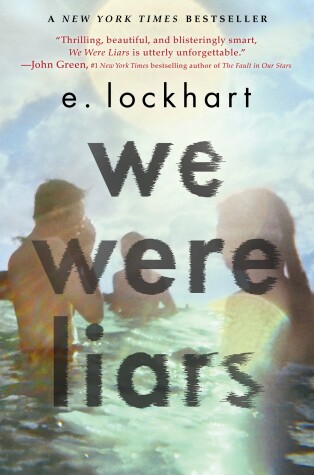Reviewed by Briana @ Pages Unbound on
The story follows teenage Cadence Sinclair Eastman, daughter of the wealthy, privileged Sinclair clan, as she spends a summer on her family’s private island, hanging out with her cousins and trying to remember what happened last summer on the island when she woke up wet on the sand, dressed only in her underwear, with no memory of why she was there.
One might assume that part of the draw of a story that takes place on a private family island would be the glamour of portraying such a life of luxury and wealth, but Lockhart nips that right in the bud by making Cadence wallow in white guilt. She hates her privilege. She hates her family for being privileged. She is a moral special snowflake for being the only one of her clan determined to hate being rich. Everyone else is shallow and short-sighted. Only she has depth and morals and can see her family for the selfish people they are.
I know our society is currently very focused on learning to be aware of your own privileges in life. I assume Cadence’s portrayal is a response to this and is an attempt to make her seem either relatable (she’s richer than you but she doesn’t want to be!) or likable (she isn’t superficial like the rest of her family!). Personally, I think the effect is just preachy. I could see if the book wanted to portray the “dark side” of the rich and show how money cannot make you happy, how Cadence’s family suffers from too-high expectations, the pressure to be perfect, the stress of having to look perfect even if their marriages or their careers are in shambles. I just think the novel goes too far with Cadence’s constant speeches about having to reject all her privilege.
The plot itself is generally unremarkable. Cadence and her cousins hang out on their island, swimming and having cookouts and whatever else people do to celebrate summer on a beach, while their parents have spats about inheritances and who the favorite child is. I have no idea what the title is supposed to referencing, as none of Cadence’s cousins seem to liars and lying doesn’t really play a role in the plot. Maybe they’re just all lying about being happy to be Sinclairs???
The final twist is the only reason I bumped my Goodreads rating of the book up to three stars. I honestly did not see the twist coming. It took me completely by surprise and added a whole new dimension to the story. This single moment of the novel is gloriously impressive. However, I don’t think it’s enough to make it worth reading the rest of the book, so I recommend passing on this one.
Initial Thoughts: The ending--wild, unpredictable, imaginative, and tragic--really saved the book. Up until then, I mostly thought the story was heavy-handed, the story of a rich privileged white girl who is the only one in her family to have the perspicacity to see how privileged and white and rich she is and feel guilty about it and rage against capitalism and the patriarchy and whatever. Pretty preachy, all things considered.
Reading updates
- Started reading
- 25 June, 2015: Finished reading
- 25 June, 2015: Reviewed
